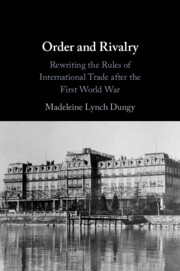
-
Select format
-
- Publisher:
- Cambridge University Press
- Publication date:
- 01 June 2023
- 15 June 2023
- ISBN:
- 9781009308892
- 9781009308908
- 9781009308878
- Dimensions:
- (229 x 152 mm)
- Weight & Pages:
- 0.62kg, 334 Pages
- Dimensions:
- (229 x 152 mm)
- Weight & Pages:
- 0.484kg, 334 Pages
You may already have access via personal or institutional login
Book description
The First World War transformed the legal and geopolitical framework for international trade by decentring Europe in global markets. Order and Rivalry traces the formation and development of multilateral trade structures in the aftermath of the First World War in response to the marginalization of Europe in the world economy, the use of private commerce as a tool of military power and the collapse of empires across Central and Eastern Europe. In this accessible study, Madeleine Lynch Dungy highlights the 1920s as a pivotal transition phase between the network of bilateral trade treaties that underpinned the first globalization of the late nineteenth century and the institutionalised regime of international governance after 1945. Focusing on the League of Nations, she shows that this institution's legacy was not to initiate a linear forward march towards today's World Trade Organization, but rather to frame an open-ended and conflictual process of experimentation that is still ongoing.
Reviews
‘An important and refreshing history of international trade - too long the Cinderella-subject of new histories of capitalism. This timely account reveals how conflict was more important than cooperation as Europeans learned they needed institutions and legal norms to keep markets open, generating a framework for world trade for decades to come.’
Patricia Clavin - Oxford University
‘With undisputed relevance to the current global situation, the author offers new insights into the role of the League of Nations and its significance for the development of multi-layered trade governance. The book convincingly analyzes the longstanding patterns of multilateral decision making and their use in controversial ideological contexts. It also shows how a new multilateral order is both urgent and difficult to implement - presenting crucial lessons to learn from a troubled past.’
Madeleine Herren-Oesch - University of Basel
‘In this outstanding book, Madeleine Dungy provides a penetrating, very wide-ranging and strikingly original reassessment of the global politics of international trade after the Great War. Drawing on a formidable array of public and private archival sources from across Europe and from both sides of the Atlantic, the book recovers the influence of internationalists projects for the construction of a new multilateral commercial order. The League of Nations provided the necessary political and administrative context for negotiations aimed at creating a new institutional architecture for international trade. Yet Dungy’s analysis is also alive to the complex interrelationship between commercial negotiations and the quest for European security and to the fundamental role of competing interests and contending conceptions of regional, global and imperial economic order. A superb study that adds much to our understanding of the international and economic history of the interwar period.’
Peter Jackson - University of Glasgow
‘In this deeply researched and highly original work, Madeleine Dungy has transformed our understanding of the international politics of trade in the twentieth century and the rise of global economic governance. This masterful book is essential reading for those interested in the history of the modern world economy and the crisis of globalization caused by the First World War.’
Jamie Martin - Harvard University
‘This is an important book not only because of its message but also because it shows how political and internationalization historiographies have matured. It convincingly explains the importance of the League of Nations (and perhaps, by implication, the United Nations) as a forum for progress in the world. On top of that, Dungy's biographical touchstone approach works well. She successfully shows how, under the designs and negotiations of the four bureaucrats, the always contested rules of world trade came together into a system that, in her concluding worlds, 'proved remarkably durable'.'
Thomas Zeiler Source: H-Diplo
‘By focusing on the four selected protagonists, Lynch Dungy has chosen an innovative approach for her book … and opened up interesting material and made it available to the professional public. Many details will be of particular interest to specialists in the history of international trade and its regulation.’
André Steiner Source: Zeitschrift für Geschichtswissenschaft
‘A sophisticated, scholarly, and highly original study of the European contribution to the making of international trade policy and regulation in the 1920s … This book is based on a wealth of archival and printed primary sources, imaginatively deployed. It deserves to take its place among the key scholarly contributions to the wider revival of the historiography of the League of Nations while also providing an illuminating study of visions of European unity and of global trade policy.’
Anthony Howe Source: European History Quarterly
Contents
Metrics
Altmetric attention score
Full text views
Full text views help Loading metrics...
Loading metrics...
* Views captured on Cambridge Core between #date#. This data will be updated every 24 hours.
Usage data cannot currently be displayed.
Accessibility standard: Unknown
Why this information is here
This section outlines the accessibility features of this content - including support for screen readers, full keyboard navigation and high-contrast display options. This may not be relevant for you.
Accessibility Information
Accessibility compliance for the PDF of this book is currently unknown and may be updated in the future.


